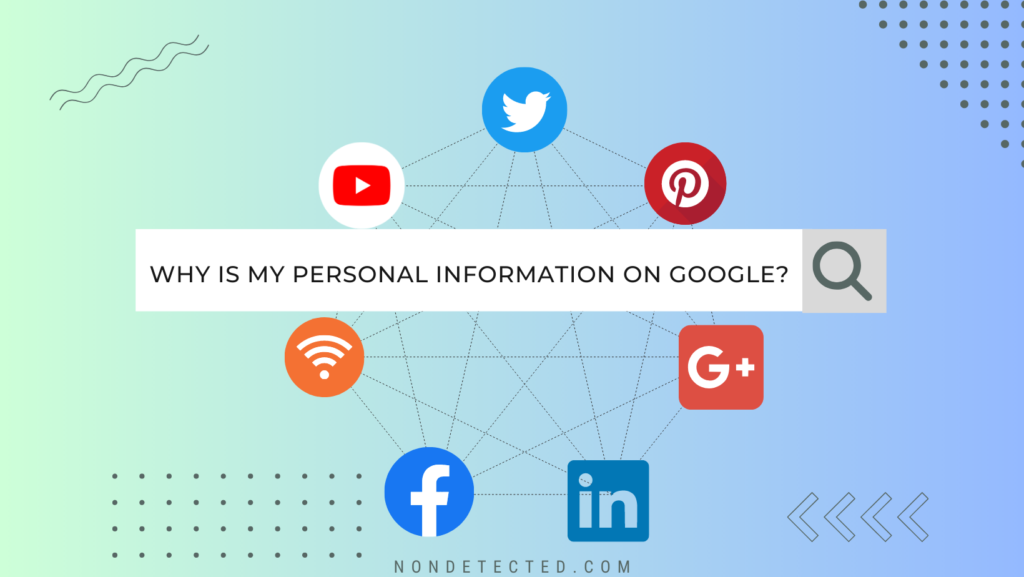Why is My Personal Information on Google?

In today’s digital age, personal information is increasingly collected and used by tech companies such as Google. Whether we’re browsing the web, using social media, or simply using our smartphones, our personal information is being tracked and recorded. The idea of having one’s personal information collected and used by companies without their knowledge or consent can be unsettling, and it raises important questions about privacy, security, and ethical considerations.
The importance of this issue is underscored by the fact that Google is the world’s largest search engine and one of the most profitable companies in the world. With over 90% of the search engine market share, it’s clear that Google plays a significant role in our online lives.
Table of Contents
- How Google collects personal information?” href=”#e18c6e6b-9966-46b6-aa6e-a9d468fc11c3″>How Google collects personal information?
- Benefits and drawbacks of Google’s use of personal information” href=”#0a05c211-7e91-45b7-8a5d-f605596cbc2b”>Benefits and drawbacks of Google’s use of personal information
- Final thoughts and recommendations” href=”#2b92fc23-f264-4317-89ee-b89a9949c91a”>Final thoughts and recommendations
It’s, therefore, imperative to understand how Google collects and uses our personal information and what the implications of this are for our privacy and security.
The nature of personal information
The collection and use of personal information by Google raise concerns about the nature of this information. It’s important to understand what personal information is, what types of personal information exist, and why it’s significant. And today, NonDetected is going to explain everything in detail.
Definition of personal information
Personal information refers to any data that can be used to identify an individual. This includes information such as a person’s name, address, phone number, email address, date of birth, social security number, and other sensitive information. Personal information can also include details about a person’s online activities, such as their search history, location data, and browsing habits.
Types of personal information
There are many different types of personal information that can be collected by Google.
Some of the most common types of personal information include:
- contact information: a person’s name, address, phone number, and email address.
- financial information: bank account numbers, credit card information, and other financial details.
- medical information: information about a person’s health, medical history, and any medications they may be taking.
- biometric information: includes fingerprints, retinal scans, and other physical characteristics that can be used to identify an individual.
- internet activity: a person’s search history, browsing habits, and social media activity.
Significance of personal information
Personal information is significant because it can be used to identify and target individuals for marketing or other purposes. For example, companies may use personal information to send targeted advertisements to specific groups of people based on their interests, age, or location. Personal information can also be used for identity theft, fraud, and other malicious purposes. As a result, it’s important to be aware of the types of personal information that are being collected and how they are being used.
How Google collects personal information?
Google collects personal information in a variety of ways, including through its search engine, Google Maps, YouTube, and other services. In this section, we’ll explore some of the methods used by Google to collect personal information, as well as the extent of data collected.
Explanation of Google’s data collection methods
Google collects personal information through a variety of methods, including:
- cookies: Google uses cookies to track user’s browsing behavior and preferences.
- web beacons: Google uses web beacons, also known as tracking pixels, to collect information about users’ interactions with websites and advertisements.
- device information: Google collects information about the devices that users use to access its services, including the type of device, operating system, and browser.
- location data: Google collects users’ location data through GPS, Wi-Fi, and cellular towers.
- social media data: Google may collect information from users’ social media accounts if they have linked those accounts to their Google profiles.
Examples of how Google tracks user data
Google tracks user data in a variety of ways, including:
- search history: Google tracks users’ search history and uses it to personalize search results.
- location history: Google tracks users’ location history and uses it to provide location-based services.
- YouTube history: Google tracks users’ YouTube viewing history and uses it to recommend videos and target ads.
- Gmail: Google scans the content of users’ emails to provide targeted advertising.
The extent of data collected by Google
The amount of personal information collected by Google is vast. According to a 2020 report by the Irish Data Protection Commission, Google collects over 200 data points on users. This includes information such as users’ search history, location data, browsing habits, and social media activity.
The use of personal information by Google
Google’s collection and use of personal information have significant implications for users’ privacy and security.
How Google uses personal information
Google uses personal information in a variety of ways, including:
- targeted advertising: Google uses personal information to deliver targeted advertising to users based on their interests, browsing history, and location.
- personalization: Google uses personal information to personalize search results, news feeds, and other services.
- analytics: Google uses personal information to analyze user behavior and improve its services.
- fraud detection: Google uses personal information to detect and prevent fraudulent activity on its platforms.
The implications of using personal information
The use of personal information by Google has several implications for users, including:
- loss of privacy: users may feel that their privacy is being violated by the collection and use of their personal information.
- security risks: the collection of personal information by Google increases the risk of data breaches, identity theft, and other security threats.
- targeted advertising: some users may find targeted advertising intrusive or annoying.
- bias and discrimination: the use of personal information by Google may lead to bias and discrimination against certain groups of users.

Benefits and drawbacks of Google’s use of personal information
The use of personal information by Google has both benefits and drawbacks. Some of the benefits include:
Personalized services: Google’s use of personal information allows for personalized search results and other services.
Improved user experience: Personalized services can improve the user experience by making it easier to find relevant information.
More effective advertising: Targeted advertising can be more effective than generic advertising.
Some of the drawbacks include the following:
- loss of privacy: the collection and use of personal information by Google can lead to a loss of privacy for users.
- security risks: the collection of personal information increases the risk of security breaches and identity theft.
- discrimination: the use of personal information can lead to discrimination against certain groups of users.
The impact on privacy and security
Google’s collection and use of personal information have significant implications for users’ privacy and security.
Risks associated with Google’s collection of personal information
The collection of personal information by Google poses several risks for users, including:
- data breaches: the more personal information a company collects, the greater the risk of data breaches.
- identity theft: personal information can be used by criminals to steal identities and commit fraud, or to use them for doxxing.
- malware and phishing attacks: personal information can be used to create targeted malware and phishing attacks.
- discrimination: the use of personal information can lead to discrimination against certain groups of users.
The impact on personal privacy
Google’s collection of personal information has significant implications for personal privacy. Users may feel that their privacy is being violated by the collection and use of their personal information. They may also be concerned about the lack of transparency around how their personal information is being used.
Strategies for enhancing online security and privacy
There are several strategies that users can use to enhance their online security and privacy, including:
- limiting the amount of personal information shared online: users can limit the amount of personal information they share online by being cautious about what they post on social media and other online platforms.
- using strong passwords: users should use strong passwords and change them frequently to prevent unauthorized access to their accounts.
- two-factor authentication: two-factor authentication can add an extra layer of security to online accounts.
- using privacy tools: users can use privacy tools such as ad blockers and virtual private networks (VPNs) to enhance their online privacy.
In the next section, we’ll explore the legal and ethical considerations of Google’s collection of personal information.
Legal and ethical considerations
Google’s collection and use of personal information raise important legal and ethical considerations. In this section, we’ll explore the legal issues surrounding the collection of personal information, the ethical considerations of personal information use, and the implications of laws and regulations on personal information use.
Legal issues surrounding the collection of personal information
The collection and use of personal information by Google are subject to various laws and regulations. Some of the legal issues surrounding the collection of personal information include:
- data protection laws: Data protection laws such as the General Data Protection Regulation (GDPR) in the EU and the California Consumer Privacy Act (CCPA) in the US regulate the collection and use of personal information.
- privacy policies: Companies such as Google are required to have clear and transparent privacy policies that explain how they collect and use personal information.
- data breaches: Companies that collect personal information are required to take steps to prevent data breaches and notify users in the event of a breach.
Ethical considerations of personal information use
The collection and use of personal information by Google raise several ethical considerations. Some of the ethical considerations of personal information use include:
- informed consent: Users should be informed about the collection and use of their personal information and given the opportunity to opt out if they so choose.
- transparency: Companies such as Google should be transparent about how they collect and use personal information.
- fairness: the use of personal information should be fair and not discriminate against certain groups of users.
Implications of the laws and regulations on personal information use
The laws and regulations surrounding the collection and use of personal information have several implications for users and companies such as Google. Some of the implications include the following:
- increased transparency: Companies are required to be transparent about how they collect and use personal information, which can help users make informed decisions about their online activities.
- greater control for users: Users have greater control over their personal information under data protection laws such as the GDPR and the CCPA.
- penalties for non-compliance: Companies that violate data protection laws can face significant penalties, including fines and legal action.
Final thoughts and recommendations
The issue of personal information on Google is of great importance in our digital age. While Google provides valuable services to users, its collection and use of personal information raise concerns about privacy, security, and ethical considerations. If you are concerned that Google is using your personal data and would like to have it deleted, a company of specialists can help you.They can remove your personal information from Google quickly and efficiently. By taking these steps, we can better protect our personal information and enhance our online security and privacy.


